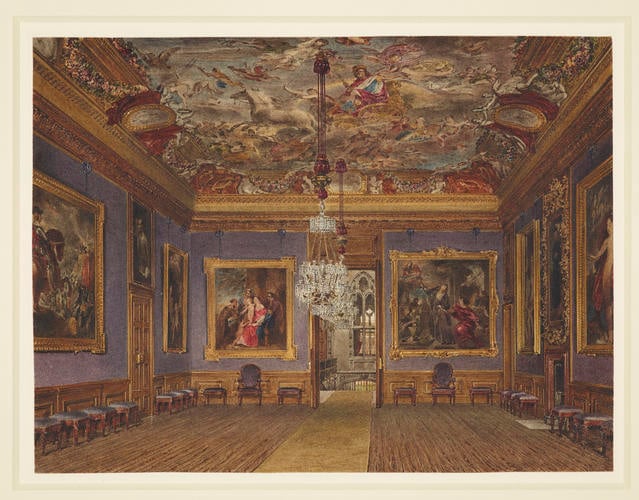-
1 of 253523 objects
The King's Drawing Room, Windsor Castle c. 1817
Pencil and watercolour with touches of bodycolour | 19.0 x 25.0 cm (sheet of paper) | RCIN 922107

James Stephanoff (1789-1874)
The King's Drawing Room, Windsor Castle c. 1817
-
A watercolour view of the interior of the King's Drawing Room, Windsor Castle, prepared for one of the plates in William Henry Pyne's History of the Royal Residences (1816-1819). Engraved by T. Sutherland, the print was published on 1 December 1817.
This watercolour depicts the original ceiling in the King's Drawing Room, which was painted by Antonio Verrio and illustrated Charles II driving through the sky in a triumphal car (reflecting the restoration of monarchy). The ceiling is now destroyed, but the original Grinling Gibbons cornice also depicted in this watercolour does survive. The picture hang in the room at this time is also recorded: on the east wall is Rubens, Battle of Nordlingen (400100), a portrait of Duns Scotus attributed to Ribera (over the door, 404967) and Luca Giordano's Adoration of the Magi (404993); on the wall opposite us Rubens's Holy Family (left, 407674) hangs opposite Pietro da Cortona's Augustus consulting a Sibyl (right, 405461); on the right wall is seen Guido Reni, Venus attired by the Graces and Perseus and Andromeda (both gifted by William IV to the National Gallery in 1836) on either side of the over-mantle, Godfrey Kneller's Michael Alphonsus Shen Fu-Tsung (405666).
The entry in John Evelyn's diary for 3 September 1685 records his great pleasure at a visit to St George's Hall, Windsor Castle. It had been completed only the previous year. This, and the adjoining space, the King's Chapel, were designed to be the most impressive and important spaces in the new State Apartments recast by Hugh May. From 1675 to 1684, Verrio painted 12 rooms and three staircases in the King's State Apartment, and six rooms and the Great Stairs in the Queen's State Apartment. The iconographic programme, common to decorative shemes commissioned for most continental European baroque palaces, uncompromisingly celebrated the quasi-divine status of the prince or monarch. At Windsor, Verrio went further and placed Charles II himself as the great saviour.
Text adapted from Charles II: Art & Power, London, 2017Provenance
Probably acquired by George IV
-
Creator(s)
Acquirer(s)
-
Medium and techniques
Pencil and watercolour with touches of bodycolour
Measurements
19.0 x 25.0 cm (sheet of paper)
Other number(s)
RL 22107